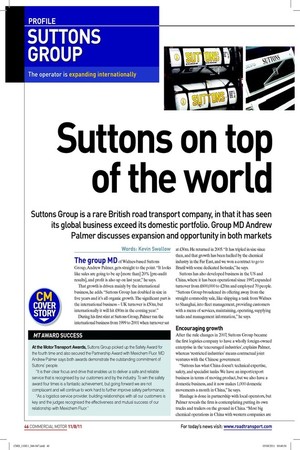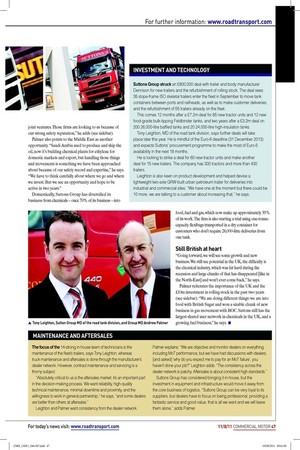Suttons on top of the world
Page 41

Page 42

If you've noticed an error in this article please click here to report it so we can fix it.
Suttons Group is a rare British road transport company, in that it has seen its global business exceed its domestic portfolio. Group MD Andrew Palmer discusses expansion and opportunity in both markets
Words: Kevin Swallow at £30m. He returned in 2005. “It has tripled in size since The group MD of Widnes-based Suttons Group, Andrew Palmer, gets straight to the point. “It looks like sales are going to be up [more than] 20% [pre-audit results], and proit is also up on last year,” he says.
That growth is driven mainly by the international business, he adds. “Suttons Group has doubled in size in ive years and it’s all organic growth. The signiicant part is the international business – UK turnover is £50m, but internationally it will hit £90m in the coming year.” During his irst stint at Suttons Group, Palmer ran the international business from 1999 to 2001 when turnover sat then, and that growth has been fuelled by the chemical industry in the Far East, and we won a contract to go to Brazil with some dedicated Isotanks,” he says.
Suttons has also developed business in the US and China, where it has been operational since 1997, expanded turnover from £600,000 to £20m and employed 70 people. “Suttons Group broadened its offering away from the straight commodity sale, like shipping a tank from Widnes to Shanghai, into leet management, providing customers with a menu of services, maintaining, operating, supplying tanks and management information,” he says.
Encouraging growth
After the rule changes in 2007, Suttons Group became the irst logistics company to have a wholly foreign-owned enterprise in the ‘encouraged industries’, explains Palmer, whereas ‘restricted industries’ means contractual joint ventures with the Chinese government.
“Suttons has what China doesn’t: technical expertise, safety, and specialist tanks. We have an import/export business in terms of moving product, but we also have a domestic business, and it now makes 1,000 domestic movements a month in China,” he says.
Haulage is done in partnership with local operators, but Palmer reveals the irm is contemplating putting its own trucks and trailers on the ground in China. “Most big chemical operations in China with western companies are joint ventures. Those irms are looking to us because of our strong safety reputation,” he adds (see sidebar).
Palmer also points to the Middle East as another opportunity. “Saudi Arabia used to produce and ship the oil, now it’s building chemical plants for ethylene for domestic markets and export, but handling those things and movements is something we have been approached about because of our safety record and expertise,” he says. “We have to think carefully about where we go and where we invest. But we see an opportunity and hope to be active in two years.” Domestically, Suttons Group has diversiied its business from chemicals – once 70% of its business – into food, fuel and gas, which now make up approximately 55% of its work. The irm is also starting a trial using one-tonnecapacity lexibags transported in a dry container for customers who don’t require 26,000-litre deliveries from one tank.
Still British at heart
“Going forward, we will see some growth and new business. We still see potential in the UK, the dificulty is the chemical industry, which was hit hard during the recession and large chunks of that has disappeared [like in the North-East] and won’t ever come back,” he says.
Palmer reiterates the importance of the UK and the £10m investment in rolling stock in the past two years (see sidebar). “We are doing different things: we are into food with British Sugar and won a sizable chunk of new business in gas movement with BOC. Suttons still has the largest shared user network in chemicals in the UK, and a growing fuel business,” he says. ■














































